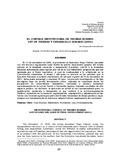| dc.rights.license | http://creativecommons.org/licenses/by-nc-sa/3.0/ve/ | |
| dc.contributor.author | Morantes Monzón, Jim Douglas | |
| dc.date.accessioned | 2018-01-11T15:04:33Z | |
| dc.date.available | 2018-01-11T15:04:33Z | |
| dc.date.issued | 2015-01 | |
| dc.identifier.issn | 0556-6606 | |
| dc.identifier.uri | http://www.saber.ula.ve/handle/123456789/44277 | |
| dc.description.abstract | El 13 de noviembre de 2000, el presidente en funciones Hugo Chávez, haciendo
uso del discurso argumental como fuente de pactos emocionales propios del estado
natural en la dualidad sensación e imaginación (Leviatán), solicitó a la Asamblea
Nacional autorización para legislar por vía de la Ley Habilitante, proposición que fue
aprobada por el Poder Legislativo, el cual de conformidad a lo establecido en la
Constitución venezolana, le otorgó 1 año para su ejercicio en las materias que el
Ejecutivo Nacional consideró conveniente, de allí que a partir del 9 de noviembre de
2001, dicho poder promulgó y sancionó 49 leyes. La presente investigación es de tipo
descriptivo bajo un diseño documental crítico, centrada en considerar desde tal
perspectiva los antecedentes inmediatos, contenido y alcance normativo
específicamente de la Ley de Tierras y Desarrollo Agrario, trayendo resultados de alto
impacto político, no obstante, la oposición no activó la vía correspondiente para su
modificación, anulación o derogación, lo que conllevó a la institucionalización
(Hobbes) normativa de la tenencia, regularización, expropiación y adjudicación de las
tierras con vocación agrícola por parte del Estado venezolano de forma pacífica y legal,
aunque con extralimitación de funciones administrativas ampliamente discrecionales. | es_VE |
| dc.language.iso | es | es_VE |
| dc.rights | info:eu-repo/semantics/openAccess | |
| dc.subject | Constitución | es_VE |
| dc.subject | Habilitante | es_VE |
| dc.subject | Presidente | es_VE |
| dc.subject | Ley y Extralimitación | es_VE |
| dc.title | El Control Institucional de Thomas Hobbes: Ley de Tierras y Desarrollo Agrario (2001) | es_VE |
| dc.title.alternative | Institutional control of Thomas Hobbes: Law on Land and Agricultural Development (2001) | es_VE |
| dc.type | info:eu-repo/semantics/article | |
| dc.description.abstract1 | The November 13, 2000, the acting president Hugo Chavez, using the
argumentative discourse as a source of own emotional pacts natural state in duality
feeling and imagination (Leviathan), asked the National Assembly authorization to
legislate by way of Enabling Law proposal that was approved by the Legislature, which
in accordance with the provisions of the Venezuelan Constitution, granted him one
year for their exercise in the matters that the Executive considered desirable, hence
from November 9 2001, that power passed 49 laws and sanctioned. This research is
descriptive design on a critical documentary, centeredconsidered from this perspective
the immediate antecedents, specifically normative scope and content of the Law on
Land and Agricultural Development, bringing results of high political impact, however,
the opposition He activated the appropriate channels for modification, cancellation or
termination, which led to the institutionalization (Hobbes) rules of tenure
regularization, expropriation and allocation of agricultural lands by the Venezuelan State in a peaceful and legal way, but with overstepping widely discretionary
administrative functions. | es_VE |
| dc.description.colacion | 59-67 | es_VE |
| dc.description.frecuencia | Anual | |
| dc.identifier.depositolegal | 199502MEI224 | |
| dc.publisher.pais | Venezuela | es_VE |
| dc.subject.facultad | Facultad de Ciencias Jurídicas y Políticas | es_VE |
| dc.subject.keywords | Constitution | es_VE |
| dc.subject.keywords | Enabling | es_VE |
| dc.subject.keywords | President | es_VE |
| dc.subject.keywords | Law and Excess | es_VE |
| dc.subject.postgrado | Postgrado en Desarrollo Agrario | es_VE |
| dc.subject.publicacionelectronica | Revista Derecho y Reforma Agraria | |
| dc.subject.seccion | Revista Derecho y Reforma Agraria: Artículos | es_VE |
| dc.subject.thematiccategory | Medio Ambiente | es_VE |
| dc.subject.tipo | Revistas | es_VE |
| dc.type.media | Texto | es_VE |


